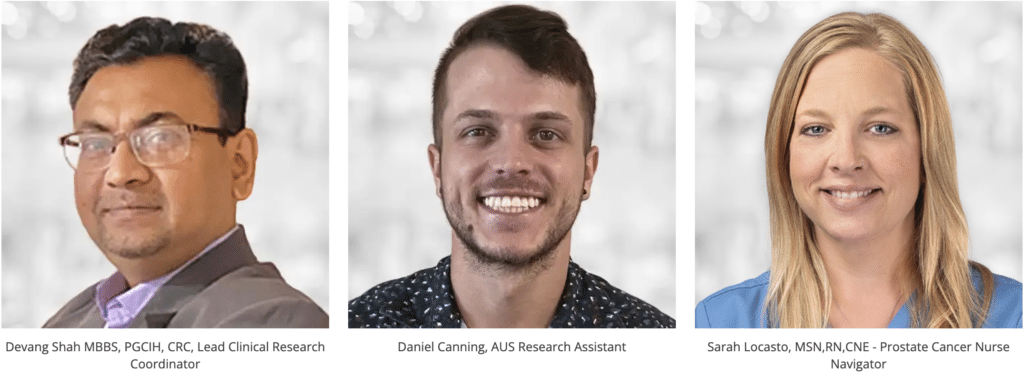New Research & Clinical Trials Team

The physicians at Associated Urological Specialists (AUS) have actively participated in medical research and clinical trials in the past. The announcement of a new research and clinical trials team and department formalizes the process and capabilities now available to their patients.
The team and the research itself are devoted to advancing the pool of knowledge so new understanding and treatments become available in the future. The research department works with pharmaceutical, biotech and medical device companies to test new treatments. Research like this paves the way for improvements in healthcare.
Research Team
Dr. Devang Shah MBBS, PGCIH, CRC – Lead Clinical Research Coordinator
Daniel Canning – Clinical Research Coordinator
Sarah Locasto, MSN,RN, CNE – Back-Up Clinical Research Coordinator
Without research, there would be no progress in health care. That’s why clinical trials play such an important role in collecting crucial data about new drugs, devices and treatments.
Physicians may recommend patients for clinical trials, or patients may seek out opportunities and volunteer. Regardless, patients typically have common questions about participating.
Patients can expect a thorough discussion and personal evaluation prior to a clinical trial, but here’s some basic information that patients need to know:
- Patients and their responses are closely monitored. Clinical trials have to meet specific criteria for patient safety, informed consent, ethical conduct and other aspects of research and must be approved by an institutional review board.
- Sponsors of the studies usually cover the costs associated with participation. The pharmaceutical or biotechnolgy companies that sponsor clinical research generally assume program costs such as bloodwork, imaging and consultations. However, patients should confirm with the study coordinator prior to enrolling, as insurance coverage and study details can differ.
- Patient confidentiality is protected. In accordance with the Health Insurance Portability and Accountability Act (HIPAA), the patient’s informed consent agreement ensures not only confidentiality of individual health records but information such as name, medical record numbers and zip codes. The informed consent agreement will detail the specific data that will be shared from the study.
- Clinical trials can vary by size, structure and objective. Patients may have different experiences with different trials, based on the needs of the research. Small-scale studies may involve just a few patients and measure optimal dosage. Larger studies may examine a drug’s effectiveness compared to current standard approved treatments. Patients can ask about the objectives up front so they have a clear understanding and expectations.
- Participation is voluntary and patients can withdraw at any time.
Without clinical trials, many of today’s therapies would not exist. Participation in current and future trials will ensure that even more effective therapies will be ready to enhance care for patients in the years ahead.
Click here for a list of the clinical trials currently underway at Associated Urological Specialists.

Areas Of Focus
Our study coordinators are experienced in coordinating clinical trials in a wide variety of areas, and have been involved with research and clinical trials for the following:
BPH (benign prostatic hyperplasia)
Associated Urological Specialists (AUS) is a unified group of Urologists and related specialists committed to providing comprehensive urological care to patients and their families around southwest Chicago and northwest Indiana. AUS has placed a tremendous emphasis on bringing together a highly dedicated and skilled set of Board-Certified professionals, equipped with the latest state of the art tools and techniques, to deliver a full range of urological care.

